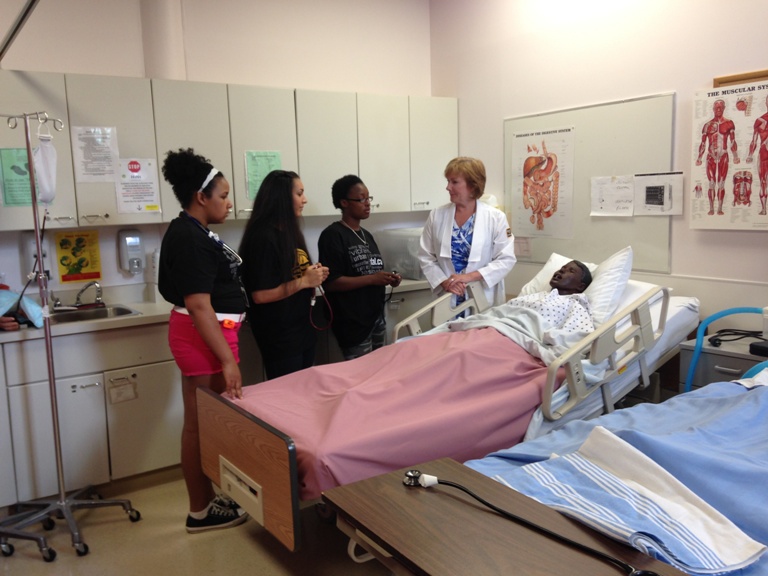HALIFAX – A camp geared towards African Nova Scotian youth is aiming to increase what’s been called a “low, almost non-existent” number of visible minorities in health professionals.

This is the first year for the camp, which is run out of Dalhousie University and gives hands-on experience for youth in the realms of medicine, dentistry and health and human performance.
Activities range from practicing CPR on mannequins to how to give an injection. Students also learned how to listen to heartbeats and identify ear infections.
Dominique Parsons’ face is filled with concentration as she slowly and carefully removes sutures from a mannequin.
The 16-year-old from Dartmouth is about to enter Grade 12 and is looking at a career in nursing.
Parsons applied for the camp for a few reasons — to get experience with the different health professions, and also because it is catered to African Nova Scotian youth.
“Usually at school, you’re a minority a lot of time so you don’t really connect with other people as well as you would do if they were the same as you,” she said.
Parsons said she doesn’t have any African Nova Scotian dentists, doctors or other health professionals to look up to as role models and adds the camp showed her it is possible for her to pursue a career in healthcare.
It is a similar story for Kayla Beals, 15, of Eastern Passage, who said she appreciates how the camp reaches out to the African Nova Scotian community.
“Eastern Passage is a predominantly white community. It’s a good idea to be with people of the same race sometimes. It feels comfortable and I don’t feel like a minority anymore,” she said.
“I feel like having a similar goal to the people around me, especially people of the same ethnicity and background as me, it is really encouraging and it makes me feel like I’m not going to be alone when I go to university.”
Beals said she is now considering a career in pathology because she likes to work in a lab and work with equations.
Program coordinator Michelle Patrick said there were 15 students, three boys and 12 girls, enrolled in the inaugural week-long camp.
Patrick said the camp aims to fill a gap in the industry when it comes to racial representation.
“We really want to encourage students first to let them know this is a possibility,” she said, adding campers seemed to know about the different career fields but may have felt apprehension about pursuing it.
The camp, she said, is meant to get rid of that hesitation.
“There’s a lack of representation of African Nova Scotian and people of African descent in the health profession. We really want those professions to look like our community, be representative of our community,” she said.
Dr. Tom Boran, the dean of dentistry at Dalhousie University, said the African Nova Scotian population is ‘missing’ at the healthcare schools at the university.
“I know it’s low or in some areas non-existent. In dentistry, at any one time, we have two to three students that are African Canadian descent,” he said.
“There is a missing piece and this is the opportunity.”
Barb Hamilton-Hinch, co-chair of the African Nova Scotia Advisory Committee, said racial under-representation in the health fields can have an impact on the patient-doctor relationship.
“Having a doctor or dentist who looks like me helps our relationship immediately. It automatically develops a relationship of an understanding that our experience has been similar,” she said.
Hamilton-Hinch said it all boils down to trust between the patient and doctor.
“That intimacy comes when you’re having someone that you think can relate to you. It brings another level of understanding culturally. People are more at ease and comfortable in sharing personal experiences,” she said.
Tatiana Clarke, 15, of Halifax is only entering Grade 10 this fall but she is already thinking about a career in physical therapy.
She said the camp helps instill confidence in her pursuit of a career in the healthcare field.
Meanwhile, Parsons said the camp has given her the confidence to pursue nursing as a career.
“It definitely reaffirmed what I wanted to do.”
Organizers plan to run the camp again next summer and expand it to accept students from across the province.
To learn more about the camp, contact michelle.patrick@dal.ca





Comments